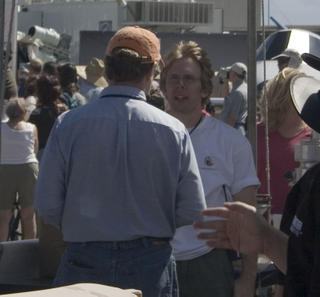On the One Hand:
The United States on Sunday stepped up its support for Ukraine to join NATO, noting the former Soviet state's progress in political and military reform.
U.S. defense officials, attending a NATO conference in Lithuania, said that while Ukraine had a long way to go on the path of reform and that NATO's entry standards must be met, there was full support from Washington for membership.
"Progress (on reform) has been made and we encourage it and are available to be of assistance in various ways," U.S. Defense Secretary Donald Rumsfeld told a press conference.
Ukraine is looking to join the alliance around 2008, during a tentatively scheduled NATO summit. Rumsfeld declined to give a timing on when Ukraine could join, saying: "That's a decision to be made by NATO."
Read the rest
here.
The US is very much for Ukraine to join NATO and the EU. This is rather interesting. It means the US is committed to peeling Ukraine out of Russia's traditional orbit. If you think about it, it makes a lot of sense. This is both from the idealistic and the cynical views of US policies.
The idealistic view is that the US policy is aimed at helping a reforming nation with promises of joining the most protected and one of the best environment's, politically, for sustained development. Additionally, it gives the Ukrainian people an oppurtunity to move to better conditions and allowing for Ukrainians that stay at home to live in much better conditions as well by potentially reducing the competition for jobs and having an extreemly active oversight for corruption imposed by the EU.
The cynical side is that it's the 'Keep the Russians Out' policy all over again. after the uber kissy faces exchanged with the Russians after the 9-11 attacks, the American-Russian relations have significantly cooled. Depending on who the successor (or the successor to the successor) to Putin is, there's the possibility of a revanchist Russia bent on rebuilding the Soviet Union. Ukraine in NATO and the EU permanently breaks that possibility. Without Ukraine, Russia lacks a very large population base of ethnic Slavs. All told, Ukraine has almost 50% of the Slavic population of Russia despite Russia having almost three times the population. The fear in Russia is that the nonslavs will - partially because of the Russian ethnoidentity; partially because of the Little Nation ethnonationalism that was so prevalant in the 1990s; and largely because Russians just aren't having kids - attempt to further break up Russia (re Chechnya). To Russians, Ukrainians are Malorus - little Russians - and of the same nationality. An addition of them would help stem the influence of the nonslav ethnicities and possible secessionist movements. Or so goes the train of thought.
From this POV of American policies with respect to even Turkey make sense. Substitute Ukraine and Russia with Turkey and Middle East, and you get the picture. However, it's not just the Americans running the show in NATO, nevermind in the EU. The Europeans do have some small say. ;)
On the other hand, the Ukrainian prospects of joining the EU and NATO from the European POV are dimmer. It's not that they don't like the idea of Ukraine joining the EU and NATO, eventually. It's just that there are a few more issues that the Europeans have to live with that the US would not. The first is that the Ukrainians have a horrible level of corruption. This needs to be fixed, or at least largely tamed, prior to joining the EU lest it get loose with the EU itself. The second is that the Ukrainian economy is...not up tot he standards of joining yet. The fiscal responsibility (*snicker*) and underlying economic economic engine are in bad shape, if improving: the EU doesn't want to be saddled with a horribly broken economy it will be pouring money into for decades and watch it all vaporize into corrupt officials' pockets. The last reason is the population of Ukraine. There's a lot of Ukrainians. If all of them could move where they will in the EU, a very large portion would up and leave. I'm guessing that it'd be about 20 to 40 %. That means somewhere between 10 and 20 million Ukrainians would move west into the 'Older EU'. Americans should keep in mind that the US absorbs about 1 to 1.5 million illegal Mexicans per year in a nation nearly 300 million strong and we have a rather large heart burn over that. 10-20 million Ukrainians scattered across a supranation of approximately the same size - and higher costing government social programs - would cause uber problems. So the European reticence is understandable.
However, Ukrainians shouldn't
despair. Getting from here to there is possible. It requires patience and a commitment to the goals. There are no comments from the Europeans along the lines of "Ukraine isn't really a part of Europe" or that "Ukraine will never be part of the EU" unlike what's happening to Turkey. It's more that Eurpoeans are just concerned with getting a pauper daduschka (pardon the bad transliteration). I know of more than one Ukrainian family that would be concerned about this if it happened on the personal level, so that states and suprastates do this shouldn't be a surprise at all. However, the light and hope of the Ukrainains is that they are on course to not be the pauper of Europe. They are making a great deal of progress even in the last six months. They just have to stay that course and they will get there. Yes, there have been mistakes made (oy! Ain't
THAT so!) However, making mistakes and government...well, that goes hand in hand. That's up to the Ukrainian people to make sure that the government fixes its mistakes.









